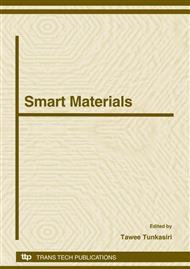p.877
p.881
p.885
p.889
p.893
p.897
p.901
p.905
p.909
Production and Characterization of Polyhydroxyalkanoates (PHAs) from Inexpensive Substrates by Alcaligenes Latus
Abstract:
Polyhydroxyalkanoate (PHA) is biodegradable polyester, which can be synthesized by many microorganisms through catabolic pathway, without producing any toxic byproduct. Owing to it special and versatile properties, this polymer has attracted much attention as a possible replacement for traditional plastics in the future. Feasibility of PHA production from inexpensive substrates was investigated by using Alcaligenes latus, gram negative bacteria, which can be grown in various types of wastewater. Four substrates were employed, i.e., wastewater from palm oil industry (oil-lean palm oil and oil-rich palm oil), wastewater from soymilk industry, and a control synthetic wastewater. The results show that PHA copolymer, poly(hydroxybutyrate-co-hydroxyvalerate) P(HB-co-HV), is produced from the metabolic pathways of A. latus. Soxhlet extractor was then employed in extraction process of the PHA copolymer. The resulting copolymer was characterized by Fourier Transform Infrared (FTIR) spectroscopy, and Nuclear Magnetic Resonance (NMR) Spectroscopy.
Info:
Periodical:
Pages:
893-896
DOI:
Citation:
Online since:
August 2008
Authors:
Price:
Сopyright:
© 2008 Trans Tech Publications Ltd. All Rights Reserved
Share:
Citation:


